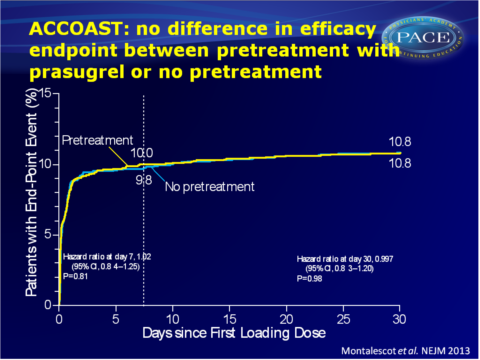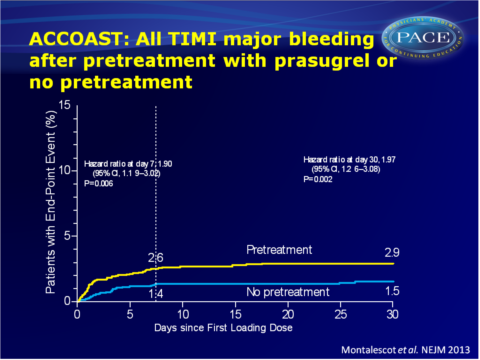ACCOAST: pretreatment with prasugrel for PCI does not improve outcome and causes more bleedings at NSTE-ACS
16/09/2013
The ACCOAST trial shows that routine pretreatment before PCI needs to be reconsidered, since prasugrel before PCI did not reduce mortality, but more bleedings occurred.
ACCOAST: A Comparison of Prasugrel at the Time of Percutaneous Coronary Intervention or as Pre-treatment At the Time of Diagnosis in Patients with Non-ST-Elevation Myocardial Infarction.News - Sep. 16, 2013
Presented at the ESC congress 2013 by: Gilles MONTALESCOT (Paris, FR)
The difference between pretreatment with prasugrel or only treatment at the time of PCI were specifically investigated in patients with acute coronary syndrome.
Download Montalescot ACCOAST 2013_PACE.pptxor click to enlarge


Background
The ACCOAST (A Comparison of prasugrel at PCI or Time of Diagnosis of Non-ST Elevation Myocardial Infarction) trial studied the potential benefits and risks of pretreatment with the P2Y12 antagonist prasugrel at non-ST-elevation myocardial infarction (NSTEMI) patients with elevated troponin who have to undergo a coronary angiography or percutaneous coronary intervention (PCI).The difference between pretreatment with prasugrel or only treatment at the time of PCI were specifically investigated in patients with acute coronary syndrome.
Main results
- After 30 days there was no difference in the primary endpoint of CV mortality, MI and stroke, between pretreatment with prasugrel and prasugrel treatment only at the time of PCI (HR: 0.997, 95%CI: 0.83-1.20, P=0.98).
- Major bleeding occurred almost twice as often after pretreatment, after 7 days as well as after 30 days (HR: 1.97, 95%CI: 1.26-3.08, P=0.002).
- Subanalysis of patients who indeed underwent PCI gave similar results with regard to the efficacy, and a slightly higher risk of bleedings (HR: 2.65, 95%CI: 1.23-5.70, P=0.010).
- No subgroup of patients was identified for whom pretreatment with prasugrel gave a favourable risk/effect-ratio.
Conclusion
In NSTE-ACS patients who are treated invasively within 48 hours after hospital admission, pretreatment with prasugrel does not lower the risk of major ischaemic events until 30 days after treatment. It does increase the number of major bleedings. There seems to be no subgroup of patients for whom prasugrel pretreatment is beneficial. Re-appraisal of routine pretreatment with prasugrel is therefore needed.Download Montalescot ACCOAST 2013_PACE.pptxor click to enlarge


